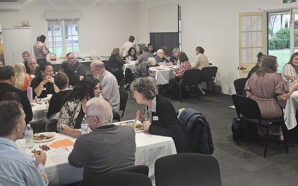It is one of the catchphrases of any sporting team, community or organisation: “We all need to work together!” Our Church often employs the word collaboration, but what are we talking about?
Loughlan Sofield ST and Carroll Juliano SHCJ have offered much wisdom on this topic, and are recognised as international experts in leadership, community growth and collaboration.
They offer four levels of collaboration:
1. Level One – Co-existence: Members may share a common mission, membership or be in the same team, but they exist independently to one another with no shared expectations or shared accountabilities. This can be like parishes where there may be many ministries, but without any reference to other ministry areas.
2. Level Two – Communication: Sharing information is the second level, involving the conscious effort to inform each other of programs, calendars and activities. Meetings may be held to share matters in common, and the sharing of common ideals and values may emerge.
3. Level Three – Cooperation: Following on from a realisation that separate entities have an impact on each other, for better or worse, there is a growth towards interdependence. In parishes, a lead project or goal may emerge, and different ministry areas will decide how to support this effort.
4. Level Four – Collaboration: When cooperation flourishes, a group may seek to move towards collaboration. At this level, everyone experiences ownership of the common mission, and works together for a common goal. Rather than pushing for their own area to thrive, there is a desire to unite the gifts of the different members, joining them together in the mission of Jesus Christ.
Loughlan and Juliano invite communities to focus on four practical steps to collaborative ministry:
1. Clarification: Because there are so many understandings of collaboration, it is important to arrive at a shared definition to avoid failure and frustration in the collaborative framework. Since collaboration is built on empowering the gifts of those involved, then at this stage, it must be agreed that there will be a process for identifying gifts, honestly addressing what or whom may be blocking the sharing of gifts, and finally how gifts can be joined together for mission.
2. Conviction: This step seeks to ensure that members are convinced of the value of collaborative ministry. After all, the temptation to go alone is often easier and far less painful. Members are encouraged to articulate their reasons for why they are convinced of the value of collaborating.
3. Commitment: It is all well and good to be convicted of a thing’s value, but it is something else to commit to embracing that way of life. It takes a conversion of heart, and this stage attempts to articulate the fears and obstacles which prevent people from committing to collaboration.
4. Capacity/Capability: This step recognises that while efforts in the first three stages may occur, little progress in collaboration may be taking place. To develop capability and capacity, a number of areas are identified for growth. These include developing skills in group leadership, conflict resolution and management, confrontation and discernment of gifts. A shared spirituality of the group is critical, as is a clear process and a developmental readiness.
As we can see, working together in a collaborative fashion means far more than labelling an enterprise as such. And such processes, while fundamental for healthy community and organisational life, are even more critical for when more than one community seeks to collaborate.
If your group or community would like support us in strengthening collaborative ministry, please contact our Pastoral Planning Office.
Richard McMahon
Tel (02) 9831 4911, 0437 497 526
rmcmahon@parra.catholic.org.au








